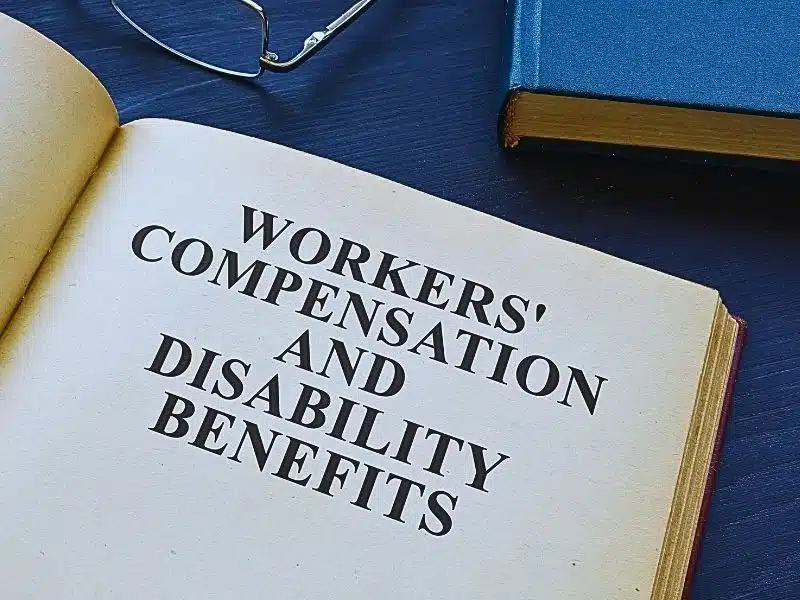How does workers’ compensation work? This may be your question after suffering a workplace injury. Workers’ compensation is an insurance plan that offers monetary support to employees who suffer from an illness or injury related to their work. In such cases, no party is held responsible for the incident. The compensation paid to the claimant is not affected by his or her negligence or the employer’s degree of fault. The employers are responsible for financing this insurance program.
Workers’ Compensation in Nevada
Workers’ compensation is an insurance policy that financially protects employees injured while on the job. It covers work-related injuries that occur during their employment. This system works on a no-fault basis, meaning employees typically don’t need to pursue personal injury claims against their employer. In Nevada, most employees are covered from the moment they start their jobs.
If you get injured at work, workers’ compensation will reimburse you for your medical expenses, a portion of your lost income, and future expenses, such as long-term medical care, rehabilitation, and future lost income. This includes injuries from slip and fall accidents, collisions with objects, overexertion, or injuries from repetitive motion.
Workers’ compensation is a separate area of law with unique rules and procedures compared to personal injury claims. As a result, there are several procedures to follow to have a successful claim. If your claim is denied, or you receive lower compensation than you qualify for, a workers’ compensation lawyer can help you get fair compensation.
What Are the Workers’ Compensation Laws in Nevada?
Before filing a claim, you should understand how workers’ compensation laws can impact you.
Employers Are Required to Carry Workers’ Compensation
In Nevada, nearly all employers are required by law to have workers’ compensation insurance coverage. The law mandates that all benefit types and the calculation of benefits must remain the same for every employee, regardless of which insurance company or provider they choose.
Important Deadlines
Employees are required to inform their employer about the incident. To ensure smooth processing of the workers’ compensation claim, individuals who suffer from a workplace injury or have been diagnosed with an occupational disease or illness must notify their employer within seven days in Nevada. The seven-day countdown starts from the moment the injury occurs or when a person is diagnosed with an occupational disease or illness.
Statute of Limitations
The statute of limitations for filing workers’ compensation claims in Nevada is 90 days from the date of the incident or the date when the employee was diagnosed with an occupational disease. It is essential to file the claim within this timeframe. Otherwise, the insurance carrier may deny the claim, and the employee may be unable to recover any compensation for any losses.
Who Is Covered Under Workers’ Compensation?
Workers’ compensation benefits are intended to compensate employees who suffer injuries in an accident while at work. The state considers the following individuals as employees:
- full-time, part-time, or seasonal workers
- workers under 18
- those without legal documentation
- public officeholders compensated for their service
- board members providing services
- musicians hired to play music, as well as orchestra and band members
However, there are exceptions outlined by Nevada laws. Casual workers whose employment lasted less than 20 days and who earned less than $500, workers in positions that Nevada law has no control over, employees temporarily working in Nevada who have insurance in their home state, and workers in jobs that have private death benefits and disability plans are not included.
An independent contractor is also not classified as an employee and therefore is not eligible for workers’ compensation benefits.
Common Types of Workers’ Compensation Claims in Nevada
Understanding the types of compensation available will help to understand why workers’ compensation is important. Workers’ compensation covers almost all work-related injuries. This includes pre-existing conditions that worsen due to work and a broad range of injuries that may occur while on the job.
Injuries caused by workplace accidents in Nevada can vary in severity, and may include cuts, bruises, fractures, and other types of harm to employees.
Repetitive Stress Injuries
Performing repetitive tasks, like typing or working on an assembly line, can lead to repetitive stress injuries. These injuries can cause discomfort and, if not treated promptly, may affect an employee’s ability to work in the future.
Neck and Back Injuries
The spine is a complicated structure prone to many types of damage, including shifting, slipping, fracturing, compressing, or overextending. Heavy lifting, getting hit by falling objects, or sudden movements can harm the neck and back. Some of the most typical kinds of spinal injuries include herniated discs, muscle strains, pinched nerves, compression fractures, facet joint damage, and spinal cord injuries.
Head Injuries
Employees are at risk of suffering head injuries due to accidents such as falls, getting struck by objects, or workplace violence. These injuries can cause trauma to the skull or brain and result in a variety of issues, including physical limitations, vision problems, difficulties with memory and concentration, as well as challenges in controlling stress and emotions.
Bone Fractures
When a bone in the body experiences excessive pressure, twisting, or sustained pressure, it can lead to a complete or partial break in its continuity, referred to as a bone fracture. Although this can happen in any occupation, it is more common in physically demanding jobs that involve heavy machinery, such as construction. Fractures can be caused by accidents such as slip-and-falls, vehicle crashes, or getting hit by moving objects or machinery.
Overexertion Injuries
Employees may experience injuries due to overexertion during their work. This can result from several factors, such as working long hours without breaks, exposure to extreme heat, or performing strenuous activities like heavy lifting. Overexertion injuries are quite common across different industries, including construction and agriculture.
Toxic Chemical Exposure
Toxic exposure injuries in the workplace can have severe consequences for workers’ health and well-being. Exposure to hazardous substances such as chemicals, gases, or fumes can lead to respiratory problems, skin disorders, neurological issues, and even long-term illnesses like cancer. Employers have a legal responsibility to provide a safe working environment and must implement measures to prevent and mitigate toxic exposures.
Struck Against or By an Object
In the workplace, objects can pose a few dangers to workers. The first one is when objects strike workers and collide with other objects, which can lead to serious injuries such as fractures, amputations, or traumatic brain injuries. The second way workplace objects can cause harm is when they fall on workers. This can happen when equipment or machinery pieces become loose or when entire structures collapse, resulting in severe and potentially life-threatening injuries to workers.
What Types of Injuries Does Workers’ Compensation Cover?
Workers’ compensation law in Nevada covers injuries that occur while the employee works. Therefore, workers may be unable to receive compensation for injuries that happen during breaks, or before they start working. Workers’ compensation insurance covers one-time injuries and occupational diseases. One-time injuries result from a single event, such as falling off company equipment. Occupational diseases are illnesses or injuries that develop over time due to continuous exposure to a toxic substance or other such causes.
Workers’ Compensation Benefits in Nevada
You are entitled to benefits to compensate you for work injuries. The purpose of these benefits are to:
- Reduce the amount of stress on you while you receive treatment for your injury.
- Provide proper compensation for any long-term damage caused by the injury.
- Offer the chance to return to work if you can do so.
After an employee suffers a work-related injury, workers’ compensation will offer compensation for the following benefits:
Medical Expenses
Workers’ compensation can offer financial assistance to help employees pay medical bills. This includes emergency room visits, surgeries, medication, or any other healthcare-related costs incurred because of the injury. For example, if an electrician accidentally injures his or her hand while working at a client’s residence, workers’ compensation insurance may cover his or her hospitalization costs.
For an injury to fully heal, it may necessitate regularly seeking medical attention. This could include doctor visits, rehabilitation costs, surgeries, medication, and other related expenditures. Workers’ compensation can provide benefits for these expenses.
Lost Wages
If a worker sustains injuries that require him or her to take time off work to recuperate, he or she may be unable to earn wages during this period. Workers’ compensation can help cover a portion of these lost wages while the worker recuperates.
If an employee gets injured and cannot carry out his or her current job, or if his or her future career prospects are impacted, it can negatively affect his or her earning capacity. Workers’ comp can help in such situations by compensating the employee for a portion of the difference between the pre-accident and post-accident wages.
Disability Benefits
Injuries sustained at the workplace may result in partial or permanent disability for employees. Workers’ compensation claims have four disability ratings, namely Permanent Partial Disability (PPD), Permanent Total Disability (PTD), Temporary Partial Disability (TPD), and Temporary Total Disability (TTD).
PPD refers to a permanent injury that hinders an employee’s ability to perform certain job-related tasks, but allows the employee to perform other duties. Workers’ comp may pay a portion of the wage differential. Alternatively, the employee may receive compensation based on the loss of use of a body part, with the amount depending on the body part affected.
PTD provides lifelong financial assistance to employees who suffer from a lifelong injury or illness that prevents them from working. This applies where an employee has suffered a permanent injury or illness that renders him or her unable to work. This type of disability rating provides ongoing financial assistance to help offset the expenses associated with living with a permanent disability.
Employees who can only work in a limited capacity can apply for TPD benefits. These benefits are intended to support workers during their recovery phase. To be eligible for TPD benefits, workers must earn less than they would if they were working at their full job capacity. TPD benefits are granted until the employee can return to their regular job or reach maximum medical improvement.
TTD benefits allow employees to claim a portion of their weekly wage until they recover fully and can return to work. If an employee needs time off to heal, he or she may not be able to work at all. Workers’ compensation allows the employee to claim a portion of the weekly wage until he or she fully recovers and can resume work.
Death Benefits
Death benefits are a form of financial aid that aims to compensate family members who have lost the financial assistance they received from the deceased employee. The requirements for eligibility may differ from state to state. Generally, they are offered only to immediate family members, such as blood relatives, spouses, children, and other close relatives dependent on the deceased employee’s financial support and living with the employee.
If an employee dies due to a workplace accident, the deceased employee’s beneficiaries may be eligible for coverage of funeral and burial expenses under workers’ compensation.
Career Rehabilitation
Career rehabilitation benefits provided through workers’ compensation aim to assist injured workers in returning to employment after an injury or illness. These benefits may include vocational training, job placement assistance, counseling, and retraining programs tailored to the worker’s abilities and limitations. By facilitating the transition back to work, career rehabilitation benefits help injured employees regain financial stability and independence while minimizing the impact of the injury on their career prospects and earning potential.
It’s crucial to have a workers’ comp attorney to guide you through the process of filing a claim. This can help you avoid delays and ensure you have proper representation if there are complications. An experienced attorney may know how much Nevada workers’ comp settlements are and can fight for you to get maximum compensation.





